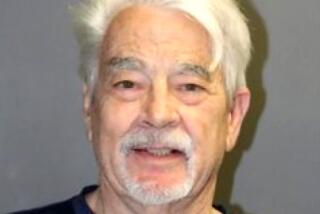Woman Says Affair With Therapist Led to Her Divorce : Ethics: A prominent Ventura psychologist is accused of unprofessional conduct. His attorney suggests the woman initiated the liaison.
- Share via
A Ventura woman testified Monday that a 10-month sexual relationship with her psychologist broke up her marriage and left her feeling depressed and suicidal.
But in cross-examination, the psychologist’s attorney suggested that the woman initiated the affair and that it occurred only after the patient-therapist relationship had ended.
Ventura psychologist Jerome R. Evans, 52, has been accused by state medical officials of unprofessional conduct in having a sexual relationship with a patient. Evans has served frequently as a court-appointed psychologist in Ventura County cases.
After a hearing expected to last at least two weeks, Administrative Law Judge David B. Rosenman will issue a finding. The allegation is not a criminal charge, but if it is upheld, the state Board of Psychology could suspend or revoke Evans’ license.
The 45-year-old woman, who has not been identified in legal records, testified Monday that she met Evans in 1978, when she and her husband sought treatment for their son’s hyperactivity. The following year, the woman testified, she asked Evans to provide her with vocational counseling and help her build self-esteem.
She quickly developed romantic feelings for Evans and began to fantasize about their sessions, she testified. After only a few office visits, she stopped consulting him.
In 1987, however, she went back to Evans for therapy. After three sessions, she said, she told the therapist that she felt attracted to him. Evans did not pursue a relationship at that time, she said, “but I felt there was a flirtation going on. He was staying away, but his body language and expressions seemed flirtatious. That was my interpretation.”
At the end of her 18th visit, the woman testified, she told Evans that she was discontinuing the therapy. On her way out of that final session, she said, the psychologist hugged her and, at her request, kissed her.
“I said, ‘Kiss me.’ He did,” she testified.
A few days later, at Evans’ invitation, the two rendezvoused in San Francisco for a sexual liaison, she testified. Several more trysts ensued, she said.
After nine months, the woman’s husband learned of the affair and moved out of their house. Marriage counseling failed and the couple eventually divorced. Evans, who was also married, told her that he felt guilty and would have to stop seeing her, the woman testified.
“I felt very abandoned,” she said. “I felt like my life had just totally dropped out from under me.” At the suggestion of another therapist, she checked into a psychiatric hospital for three days.
She still hoped for a relationship with Evans, she said, and the psychologist gave her encouragement by calling her in September, 1988, a few months after their sexual relationship ended.
“I felt this was some sort of a sign that he wanted to have contact with me,” she said.
But under questioning by Deputy Atty. Gen. Elisa B. Wolfe, the woman said that the affair did not resume and that she needed to see a different psychologist for more than a year afterward.
On cross-examination by Evans’ attorney, Richard A. Regnier, the woman acknowledged that Evans kept their sessions on a professional level and never discussed sex. It was only after the 18th session that he began meeting her and sending her love letters, she said.
Evans displayed no emotion as his former client spent the entire day on the witness stand discussing their relationship. Along the back wall of the small hearing room sat Evans’ wife, Barbara, and the woman’s current husband.
The complaint against Evans was filed by the woman’s former mother-in-law and by a Ventura physician, Wolfe said. The woman testified Monday that she also filed a complaint, but both attorneys said they were unaware of the action.
Suzanne Taylor, enforcement analyst for the Board of Psychology, said sexual misconduct is by far the largest factor in disciplinary actions against therapists.
In the 1991-92 fiscal year, 16 psychologists statewide were disciplined for sexual misconduct, she said. The licenses of eight were revoked, five surrendered their licenses voluntarily and three were suspended. All but two or three of the offenders were men, she said.
“We consider sexual misconduct the most serious violation,” Taylor said. “There’s a significant amount of trust involved with a female patient and her psychologist, and when they abuse that trust it becomes a very serious problem.”
Times staff writer Sara Catania contributed to this story.
More to Read
Sign up for Essential California
The most important California stories and recommendations in your inbox every morning.
You may occasionally receive promotional content from the Los Angeles Times.










